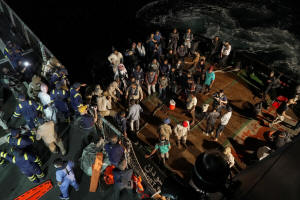Sudan paramilitary RSF to attend Jeddah talks with armed forces
 Send a link to a friend
Send a link to a friend
 [May 06, 2023]
By Aziz El Yaakoubi and Nafisa Eltahir [May 06, 2023]
By Aziz El Yaakoubi and Nafisa Eltahir
RIYADH (Reuters) -Envoys of Sudan's paramilitary forces will attend
talks with the army scheduled for Saturday in Jeddah, their leader said,
as the gathering's international mediators pressed for an end to a
conflict that has devastated the country.
The U.S.-Saudi initiative is the first serious attempt to end three
weeks of fighting that have has turned parts of the Sudanese capital
Khartoum into war zones and derailed an internationally backed plan to
usher in civilian rule following years of unrest and uprisings.
Riyadh and Washington earlier welcomed the "pre-negotiation talks"
between the army and the paramilitary Rapid Support Forces (RSF), and
urged them to actively engage following numerous violated ceasefires.
But both sides have made it clear they would only discuss a humanitarian
truce, not negotiate an end to the war.
Confirming his group's attendance, RSF leader Mohamed Hamdan Dagalo,
commonly know as Hemedti, said he hoped the talks would achieve their
intended aim of securing safe passage for civilians.
Sudan's armed forces said they sent a delegation to the Red Sea city on
Friday evening, but special envoy Dafallah Alhaj said the army would not
sit down directly with any delegation that the "rebellious" RSF might
send.

Hemedti has meanwhile vowed to either capture or kill army leader Abdel
Fattah al-Burhan, and there was also evidence on the ground that both
sides remain unwilling to make compromises to end the bloodshed.
In the city of Bahri across the Nile from Khartoum, warplanes were heard
overnight and explosions startled residents. "We don't leave the house
because we're scared of stray bullets," said a local who gave his name
as Ahmed.
An eyewitness in Eastern Khartoum reported gun clashes and airstrikes
over residential areas on Saturday.
The Turkish ambassador's car also came under fire from unknown
assailants, a Turkish diplomatic source said. The envoy was safe inside
the embassy.
The conflict erupted on April 15, following the collapse of an
internationally backed plan for a transition to democracy.
[to top of second column]
|

Saudi Royal Navy officials help
civilians onboard their ship to be evacuated to Saudi Arabia from
Sudan to escape the conflicts, in Port Sudan, Sudan, April 30, 2023.
REUTERS/Mohammed Benmansour

Burhan, a career army officer, heads a ruling council installed
after a 2021 military coup and the 2019 ouster of long-time autocrat
Omar al-Bashir, while Hemedti, a former miitia leader who made his
name leading militias in the Darfur conflict, is his deputy.
Prior to the fighting, Hemedti had been taking steps like moving
closer to a civilian party that suggest he has big political plans.
Burhan has blamed the war on his "ambitions."
HUMANITARIAN CATASTROPHE
Western powers have backed the transition to a civilian government
in a country that sits at a strategic crossroads between Egypt,
Saudi Arabia, Ethiopia and Africa's volatile Sahel region.
White House national security adviser Jake Sullivan was travelling
to Saudi Arabia for talks with Saudi leaders.
Saudi Arabia has had close ties to Burhan and Hemedti, both of whom
sent troops to help the Saudi-led coalition in its war against the
Houthi group in Yemen. The kingdom is also focused on security in
the Red Sea, which it shares with Sudan.
The U.N. has significantly cut back its operations in Sudan after
three of its employees were killed and its warehouses were looted,
and sought guarantees of safe passage of humanitarian aid.
The fighting has also impacted vital infrastructure and caused the
closure of most hospitals in conflict areas. U.N. agencies have
warned of a humanitarian catastrophe if clashes continue.
The World Health Organisation said on Saturday it had delivered
medical aid to Port Sudan, but was awaiting security and access
clearances that have prevented several such shipments from reaching
Khartoum, where the few hospitals operating are running out of
supplies.
(Reporting by Moaz Abd-Alaziz and Nafisa Eltahir in Cairo and Emma
Farge in Geneva and Huseyin Hayatsever in Istanbul, writing by Aziz
El Yaakoubi and Michael Georgy; Editing by Raju Gopalakrishnan and
John Stonestreet)
[© 2023 Thomson Reuters. All rights
reserved.]This material may not be published,
broadcast, rewritten or redistributed.
Thompson Reuters is solely responsible for this content. |